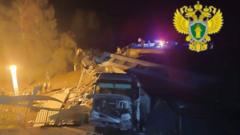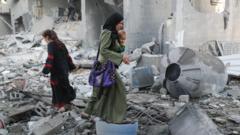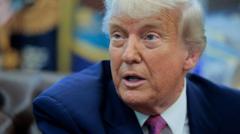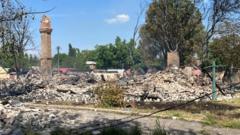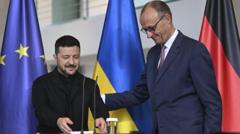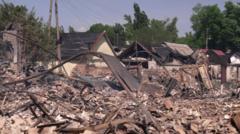As peace discussions loom, Ukraine holds its position and waits for clarity on Russia's ceasefire proposal following preliminary exchanges.
**Ukraine Awaits Russia's Ceasefire Proposal Ahead of Istanbul Negotiations**

**Ukraine Awaits Russia's Ceasefire Proposal Ahead of Istanbul Negotiations**
Negotiations in Turkey may signal a shift in dialogue between Ukraine and Russia as both sides prepare for peace talks.
In what could be a significant step towards peace, Russia has announced it will send a delegation to Istanbul on Monday for a second round of talks with Ukraine, as confirmed by Kremlin spokesman Dmitry Peskov. He noted that Moscow is currently developing its conditions for a temporary truce, which are set to be discussed in Turkey.
Ukraine remains open to dialogue but has made it clear that it will not dispatch its delegation until it receives detailed information regarding Russia's ceasefire proposal. The first round of negotiations, conducted earlier this month, involved lower-level representatives from both countries and resulted in the return of hundreds of prisoners—the largest exchange since the onset of Russia's aggressive campaign.
Ukrainian Foreign Minister Andrii Sybiha reiterated Ukraine’s commitment to the ongoing negotiations, stating that an unconditional ceasefire from Moscow is a prerequisite for any further constructive dialogue. “We want to see these meetings continue because our objective is to conclude the war by the end of this year,” Sybiha asserted during a joint press conference with his Turkish counterpart, Hakan Fidan.
While it is expected that neither Russian President Vladimir Putin nor Ukrainian President Volodymyr Zelensky will attend these upcoming discussions, Fidan indicated Turkey's aspiration to eventually facilitate a high-level summit including prominent leaders such as former President Trump alongside Putin and Zelensky.
Peskov further stated that the prospect of such a summit hinges on meaningful progress achieved in preliminary discussions. He acknowledged remarks made by Gen. Keith Kellogg, Trump's envoy to Ukraine, regarding NATO’s enlargement concerns as “fair.” Kellogg underscored that Ukraine’s inclusion in the military alliance is not being actively pursued.
In a noteworthy development, Germany's newly appointed Chancellor Friedrich Merz communicated that Berlin would assist Kyiv in the production of long-range missiles for defense against potential future Russian incursions. In response, the Kremlin expressed that any amendment to existing restrictions on missile capabilities would signify a perilous shift in policy that could obstruct ongoing peace efforts.
Currently, Russia maintains control over approximately 20% of Ukraine's recognized territory, including Crimea—a region it annexed in 2014, intensifying tensions that have remained unresolved.
Ukraine remains open to dialogue but has made it clear that it will not dispatch its delegation until it receives detailed information regarding Russia's ceasefire proposal. The first round of negotiations, conducted earlier this month, involved lower-level representatives from both countries and resulted in the return of hundreds of prisoners—the largest exchange since the onset of Russia's aggressive campaign.
Ukrainian Foreign Minister Andrii Sybiha reiterated Ukraine’s commitment to the ongoing negotiations, stating that an unconditional ceasefire from Moscow is a prerequisite for any further constructive dialogue. “We want to see these meetings continue because our objective is to conclude the war by the end of this year,” Sybiha asserted during a joint press conference with his Turkish counterpart, Hakan Fidan.
While it is expected that neither Russian President Vladimir Putin nor Ukrainian President Volodymyr Zelensky will attend these upcoming discussions, Fidan indicated Turkey's aspiration to eventually facilitate a high-level summit including prominent leaders such as former President Trump alongside Putin and Zelensky.
Peskov further stated that the prospect of such a summit hinges on meaningful progress achieved in preliminary discussions. He acknowledged remarks made by Gen. Keith Kellogg, Trump's envoy to Ukraine, regarding NATO’s enlargement concerns as “fair.” Kellogg underscored that Ukraine’s inclusion in the military alliance is not being actively pursued.
In a noteworthy development, Germany's newly appointed Chancellor Friedrich Merz communicated that Berlin would assist Kyiv in the production of long-range missiles for defense against potential future Russian incursions. In response, the Kremlin expressed that any amendment to existing restrictions on missile capabilities would signify a perilous shift in policy that could obstruct ongoing peace efforts.
Currently, Russia maintains control over approximately 20% of Ukraine's recognized territory, including Crimea—a region it annexed in 2014, intensifying tensions that have remained unresolved.


